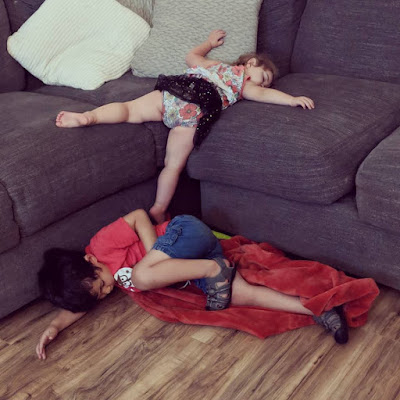What about sleep?
sleep in history and culture
notes by Sandra Dodd unless otherwise indicated
In the U.S., not sleeping eight hours straight is considered "a sleep disorder." People who sleep less are seen as anomalies or cheaters. People who sleep more are called sloths and lazy. It's not examined very well.
Many of our fears and disconnects very likely are related to our odd habits and beliefs about sleeping separately, or at least forcing children to sleep separately. Rumor and assumption is that it comes from Victorian "science" and ideas about breathing other people's germs, and about the affluence of having individual rooms (and poorer people copying that affluence when possible) but looking around even in my own family, the theory doesn't really hold. Poorer families in the mid-20th century shared rooms, but weren't proud of it so it wasn't held up as right and good.
In the U.K, people seem more likely to sleep with a window open, than in the U.S.
In India, families are more likely to sleep in the same room, if not in the same bed.
Not just poor families with small houses.
I'm going to collect things I find that might shed light on what is "natural" or at least what the range of belief and practice is. No one will ever collect it all, but I'm going to keep this page to collect what I come across.
Is “8 Uninterrupted Hours a Night” Flawed Conventional Wisdom?"—the first thing I ever read about biphasic sleep. I left this comment:
I like the sentinal theory. I’ve often thought that teenagers’ propensity to stay up late might have been very useful in “the old days” (caves, camps or castles) because they could keep watch while they talked to each other. And their sleeping in the daytime while others are awake is seen as sloth in modern days by too many people, but I think as long as they get sleep, it shouldn’t matter so much what time it is. SandraDodd.com/sleep
2013 article with some examples of evidence: How Our Ancestors Used to Sleep Twice a Night and Highlighting the Problem of Present Shock by Jeremy D. Johnson
2012: The myth of the eight-hour sleep, by Stephanie Hegarty, BBC News
How to Sleep like a Hunter-Gatherer, book review with lots of info at Discover Magazine
Sleep We Have Lost: Pre-industrial Slumber in the British Isles A. Roger Ekirch, The American Historical Review, April 2001
On a site called "Paleohacks" they discuss bimodal or segmented sleep here:
How does bimodal/segmented sleep feel?
and
Anyone getting less sleep on a paleo diet?
Everything You Always Wanted To Know About Sleep (But Were Too Afraid To Ask)
By Bora Zivkovic | August 29, 2011 |
Science-based commentary and humor, more than research, but it is at the Scientific American blogs site and has some interesting things.
backup link
Wild Nights: How Taming Sleep Created Our Restless World Benjamin Reiss, 2017
reviews/commentary on various sites:
An essay by Benjamin Reiss, the author, at Powell Books
Listen to an interview with the author: Benjamin Reiss Explores The History Of Sleep And Sleeplessness, from March 2017, on the Georgia Public Radio site [give it a couple of minutes for the sound to start]
Benjamin-Reiss.com/wild nights (his own site)
NY Times Review
Barnes & Noble review
New Republic review, which includes this:
Up to 70 million Americans suffer from some form of sleep disorder, and millions more self-medicate with booze, drugs, meditation, diets, or elaborate hygiene regimens. Offices are strewn with Red Bulls, coffee machines, and (when budgets allow) the occasional napping pod. We complain about sleeplessness in the same way we complain about how busy we are: as a signal of our success and engagement with society.
photos are links


Sleeping (for unschoolers)

Thoughts on "bedtime"

Co-sleeping

P.S.
Sleep We Have Lost: Pre-industrial Slumber in the British Isles
A. Roger Ekirch
The American Historical Review, April 2001
That article was linked on this page for a while, but the site (historycooperative.org) quietly replaced it with a different article on sleep, maybe because it's only online at professional and academic sites. Perhaps they were told it wasn't to be public.
Because it's from 2001, many other papers reference it.
If you're a person with access to scholarly or professional online libraries, you can find it easily.
While looking, I found someone had described it very negatively. This guy is "an independent freelance sleep expert." He has things to sell.
Click here to read my brief commentary and a link to the criticism.



